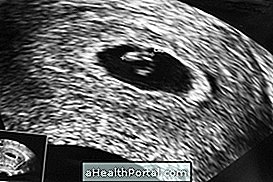Combined injectable contraceptives contain a combination of estrogen and progestogen, which must be administered by a health care provider intramuscularly every month.
This type of contraceptive works similarly to the daily pill, inhibiting ovulation and making the cervical mucus thick, preventing the passage of sperm. Some names of this type of injectable contraceptive are Cyclofemina, Mesigyna, Perlutan, Ciclovular and Unociclo.
The price of injectable contraceptives for monthly use ranges from 15 to 45 reais, depending on the medicine and the region where it is marketed, and can be purchased at any pharmacy.
![]()
How to use injectable contraceptives
For women with a normal menstrual cycle, who do not use the pill or other contraceptive injection, the first injection should be taken by the 5th day of the onset of menstruation and the following should be given every 30 days, plus or minus 3 days, regardless of of menstruation. If there is a delay of more than three days for the new injection, the woman should be targeted for condom use.
To start after delivery, the woman should take the injection between the 21st and 28th day after the baby's birth, and to start using after an abortion or after having taken the morning-after pill, one can take the injection immediately.
You can also take the first injection on the same day that you decide to change the contraceptive pill or quarterly injection, without the need to use a condom. If the woman did not use any contraceptive method before and had intercourse, she should perform the pregnancy test before taking the injection. Learn how to change your contraceptive without risking becoming pregnant.
The application of the injection should be done by the doctor, nurse or pharmacist being advised against the administration by the woman herself.
Main side effects
The monthly contraceptive injection can lead to breast pain, nausea, vomiting, headache, dizziness and the woman can gain weight.
In addition, menstrual changes may occur, and in these cases the woman should be evaluated by a gynecologist to perform tests to identify if there is any other cause for bleeding, such as pelvic inflammatory disease, for example. If there is no apparent cause for heavy bleeding and the woman is not comfortable with this method, it is advisable to replace this injection with some other contraceptive method.
Who should not use
The monthly contraceptive injection is not indicated for people who are hypersensitive to any component of the product formulation, pregnant, women who are breastfeeding up to 6 weeks postpartum, current breast cancer or suspected hormone-dependent malignancy, severe headaches with focal neurological symptoms, severe hypertension, vascular disease, history of thrombophlebitis or thromboembolic disorder, and history of ischemic heart disease or complicated heart valve disease.
In addition, the injection should also not be used in women with diabetes with nephropathy, retinopathy, neuropathy or other vascular disease or diabetes lasting more than 20 years, systemic lupus erythematosus with positive anti-phospholipid antibodies, a history of liver disease, which have undergone a large surgery with prolonged immobilization, who suffer from abnormal uterine or vaginal bleeding or who smoke more than 15 cigarettes per day, over the age of 35 years.






















